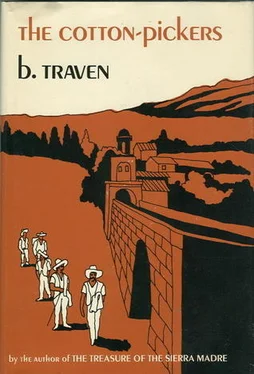B. Traven - The Cotton-Pickers
Здесь есть возможность читать онлайн «B. Traven - The Cotton-Pickers» весь текст электронной книги совершенно бесплатно (целиком полную версию без сокращений). В некоторых случаях можно слушать аудио, скачать через торрент в формате fb2 и присутствует краткое содержание. Год выпуска: 1969, Издательство: Hill and Wang, Жанр: Проза, на английском языке. Описание произведения, (предисловие) а так же отзывы посетителей доступны на портале библиотеки ЛибКат.
- Название:The Cotton-Pickers
- Автор:
- Издательство:Hill and Wang
- Жанр:
- Год:1969
- ISBN:нет данных
- Рейтинг книги:3 / 5. Голосов: 1
-
Избранное:Добавить в избранное
- Отзывы:
-
Ваша оценка:
- 60
- 1
- 2
- 3
- 4
- 5
The Cotton-Pickers: краткое содержание, описание и аннотация
Предлагаем к чтению аннотацию, описание, краткое содержание или предисловие (зависит от того, что написал сам автор книги «The Cotton-Pickers»). Если вы не нашли необходимую информацию о книге — напишите в комментариях, мы постараемся отыскать её.
—Book World
The Cotton-Pickers — читать онлайн бесплатно полную книгу (весь текст) целиком
Ниже представлен текст книги, разбитый по страницам. Система сохранения места последней прочитанной страницы, позволяет с удобством читать онлайн бесплатно книгу «The Cotton-Pickers», без необходимости каждый раз заново искать на чём Вы остановились. Поставьте закладку, и сможете в любой момент перейти на страницу, на которой закончили чтение.
Интервал:
Закладка:
At about half past eleven every morning, Señor Doux was finished with his account books and ready to sit down to lunch. At ten, unable to hold out until noon, he would eat a cold chicken; but now he had his first proper meal of the day.
Then he took a siesta. At five he got up, washed and shaved, and, driven by hunger, hurried into the café.
He stayed in the café until closing time. The local police weren’t concerned with the moral behavior of the townspeople; they left that to the people themselves. Anyone who had the money and time to hang about all night in a café was free to do so; it was his money, his time, and his health. When the place was empty the landlord would close up, if he pleased, without the advice or penalties of the police. And as there was no official closing time, no one got any satisfaction out of defying regulations; thus at midnight the cafés were so empty that it hardly paid to keep the lights on. The people who for professional reasons had to be up all night didn’t frequent the cafés, but were to be found in the bars, which served full meals or specialty dishes at all hours of the day and night, and were cheaper than the cafés.
No matter how quiet the café was, we in the bakery were having our busiest time at midnight.
“You can clean up the baking sheets,” the master baker told me. “You’ll be able to do that all right. If the old girl comes in,” he said, referring to Señora Doux, who was barely thirty, “just keep on cleaning baking tins. She has to poke her nose into everything, but if you’re busy she won’t notice that you don’t know the trade. She won’t come down here now, though, because the old man’s up there with her, and they don’t often get around to wasting time on that! It beats me that they find any time or thought for it at all, but I don’t suppose their minds are really on it while they’re at it. They’re more likely to be thinking about us and wondering if we’re beating up an egg or two for ourselves. Good idea. We’ll do it now.”
He took some eggs, broke them in businesslike fashion, gave them a quick whisk, added some butter, and popped them into the oven, producing a baked omelet. After we finished it off, I learned how to clean the baking sheets. It wasn’t as simple as it sounds, but something that had to be learned properly. Then I had to weigh off flour, which must be done exactly. Then I had to break five hundred eggs and separate the yolks from the whites. If you went about this in mother’s way, it would take a week; here, I had to break and separate the five hundred eggs in about twenty minutes, and if the slightest trace of yolk got into the whites there would be culinary complications.
Later I learned to look after the dough-mixing machines, keep the oven fires going, set the dough for bread and rolls, ice the small cakes, cut the flan puddings and prepare them for decoration, wash the pots and pans, wipe off the tables, sweep the bakehouse, crush the sugar for the icing, prepare the icing, and do many other things. I learned them all bit by bit; that way, one can learn anything. There’s absolutely nothing that you can’t learn if you go about it one step at a time.
Saturday arrived — pay day. But there was no pay. “Mariana, tomorrow,” said Señor Doux. Sunday was the busiest day of the week, but when it came to paying wages, Señor Doux explained that he never paid wages on Sunday. “Mariana.” But on Monday he didn’t pay because he hadn’t been to the bank.
On Tuesday there wasn’t enough money in the till because he had spent the money he’d brought from the bank for supplies. On Wednesday, the waiters got paid first; on Thursday he had no money on hand and couldn’t pay the bakers. On Friday he couldn’t be found; whenever anyone went to look for him they were told he’d just gone to his flat and didn’t want to be disturbed. By Saturday two weeks’ wages were due, but then his outgo was so heavy because he had to buy supplies for Sunday, “the busiest day,” and besides this the banks closed at noon on Saturday. “Mariana,” he said; but tomorrow was Sunday, and he never paid wages on Sundays. “Mariana,” he recited; but on Monday he didn’t go to the bank. And so it went on.
I had been there three weeks when I got my first pay; and then I was paid not for three weeks but for one week. It went on and on like this, with Señor Doux always being weeks and weeks in arrears with the wages. But we couldn’t be fifteen minutes behind in our work; if we were, there was hell to pay, for customers expected their bread and pastries on the dot, like clockwork. We had to put in fifteen, sixteen hours a day, and sometimes as many as twenty-one. Señor Doux took this for granted; he also took it for granted that he paid wages when it suited him, and not when they fell due.
The master baker had four months’ wages owing him. He couldn’t have left the place even if he’d wanted to, for Doux would have taken months to pay off the balance. As for the rest of us, there was no other work to be found, and even if there had been, we had no time to go and look for it. By the time we’d finished in the bakehouse it was usually late after-. noon and often evening, and places of work where we might have inquired for a job were already closed. We just had to stick it out at the Aurora. If you want to live you have to eat, and if you can’t find food any other way you have to fall in line with the man who has the food.
The waiters were no better off. They received only twenty pesos a month and were expected to live on their tips. But the people weren’t liberal with tips; and when customers were few and far between, the waiters had an even harder time. Then, too, they were blamed for the shortage of customers and Señora Doux begrudged them even their twenty pesos in wages. The bakers lived in the dormitory, but the waiters had families and lived at home, so that they had household expenses. They weren’t even given food, but got a meal only occasionally as a favor or special privilege.
One of the waiters got the fever and was dead in three days; he was a Spaniard who had come over here only two years before. A Mexican called Morales came to take his place, a quick, intelligent fellow. When I had to take pastries into the café I would notice that Morales was usually talking to one or another of his fellow waiters. Of course they always talked among themselves when they weren’t serving customers, but now I saw a difference. Before, the waiters had talked together superficially, about the lotteries or about their side activities or about girls or about their families. They had laughed and joked as they gossiped.
But when Morales spoke with them it wasn’t a laughing matter, and they listened to him attentively. Morales always did the talking and the others always listened. I saw something come to life: the Union of Restaurant Employees.
The Mexican trade unions had no cumbersome bureaucratic machinery. Their secretaries didn’t consider themselves to be “officials,” but were actually young hotheaded revolutionaries. The Mexican unions had come into being during the 1910-1920 Revolution, and had developed along the most modern lines. They could draw upon the experiences of the North-American trade unions and of the Russian Revolution; they had the explosive power of a young Sturm and Drang movement, and the elasticity of an organization that is still feeling its way and changing its tactics daily.
Up the street at the Moderna there was a waiters’ strike.
Doux, however, smiled to himself, having no fear of such a thing happening in his place. And now all the Moderna’s customers were coming to Doux’s Café Aurora because they were ill at ease in the strike-bound Moderna. They had good reason to be, for the police were neutral in the struggles of striking workers. If a customer went into a strike-bound café and got hit on the head with a flying brick or a bottle, he would be helped to the Red Cross station to get his wound dressed, but aside from that the police wouldn’t worry about him. After all, the pickets in front of the café had warned him of the strike; he had read of it in the newspapers and had had enough handbills thrust at him, so that he might have known what to expect. There was no need for him to go into this café; he could have gone to another one, or taken a seat in the plaza, or gone for a promenade. Anyone who deliberately enters a place where stones are being thrown has only himself to blame if he gets one on the head.
Читать дальшеИнтервал:
Закладка:
Похожие книги на «The Cotton-Pickers»
Представляем Вашему вниманию похожие книги на «The Cotton-Pickers» списком для выбора. Мы отобрали схожую по названию и смыслу литературу в надежде предоставить читателям больше вариантов отыскать новые, интересные, ещё непрочитанные произведения.
Обсуждение, отзывы о книге «The Cotton-Pickers» и просто собственные мнения читателей. Оставьте ваши комментарии, напишите, что Вы думаете о произведении, его смысле или главных героях. Укажите что конкретно понравилось, а что нет, и почему Вы так считаете.











